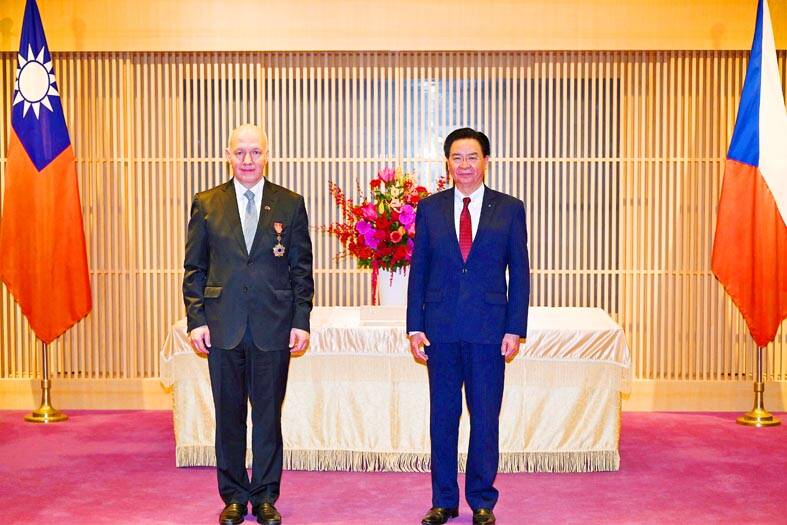The Ministry of Foreign Affairs yesterday awarded visiting Czech Senator Pavel Fischer a medal of friendship in recognition of his contributions to promoting closer relations between the countries.
Minister of Foreign Affairs Joseph Wu (吳釗燮) conferred the Friendship Medal of Diplomacy on Fischer during a ceremony at the ministry’s offices in Taipei.
Fischer, chair of the Czech Senate’s Foreign Affairs, Defense and Security Committee, is known for being friendly toward Taiwan, notably helping facilitate Czech Senate President Milos Vystrcil’s historic trip to Taiwan in September 2020, the ministry said in a news release.

Photo: Chang Chia-ming, Taipei Times
During that visit, Vystrcil became the first incumbent speaker from a foreign parliament to address the Legislative Yuan in 45 years, the ministry said.
Fischer also helped Taiwan procure COVID-19 vaccines donated by the Czech Republic in 2020, and initiated several pro-Taiwan proposals in the Czech Senate, including one passed unanimously calling for Taiwan to participate in the annual World Health Assembly in 2021, it said.
The senator arrived early yesterday for a three-day visit.
In other developments, Taiwan on Monday officially opened a representative office in Montreal, its fourth office in Canada, in part to build closer ties with the technology hub and support overseas Taiwanese in French-speaking Quebec.
Representative to Canada Harry Tseng (曾厚仁) and office chief Rita Chen (陳珮瑩), who most recently served as Taiwan’s deputy representative to New York, oversaw a ceremony opening the Taipei Economic and Cultural Office, Montreal, also known as Bureau Economique et Culturel de Taipei a Montreal.
In a prerecorded address aired at the ceremony, Wu said the latest office in Canada showed Taiwan’s determination to expand its relations with the North American country on all fronts.
Tseng said the opening of the Montreal office came in response to years of anticipation from overseas Taiwanese in Quebec and reflected the high priority Taiwan’s government puts on ties with Canada.
The ceremony was also attended by several Canadian lawmakers, including Judy Sgro, chair of the Taiwan-Canada Parliamentary Friendship Group; Pierre Paul-Hus; Simon-Pierre Savard-Tremblay; and Denis Trudel.
The ministry said it chose Montreal as the site for its newest office in Canada because it is the largest city in Quebec, and is known as a technology hub, notably in video game and artificial intelligence development.
The city is also home to the headquarters of the International Civil Aviation Organization.
The Montreal office would be responsible for Quebec, New Brunswick, Newfoundland and Labrador, Nunavut, and Saint Pierre and Miquelon.
Taiwan’s main representative office is in the capital, Ottawa, and it also has branch offices in Toronto and Vancouver.
The Montreal office’s address is 2310-1800 McGill College Ave, Montreal, QC H3A 3J6, Canada, and its telephone number is 1-514-282-8008. Its Web site is www.roc-taiwan.org/cayul.

ENDEAVOR MANTA: The ship is programmed to automatically return to its designated home port and would self-destruct if seized by another party The Endeavor Manta, Taiwan’s first military-specification uncrewed surface vehicle (USV) tailor-made to operate in the Taiwan Strait in a bid to bolster the nation’s asymmetric combat capabilities made its first appearance at Kaohsiung’s Singda Harbor yesterday. Taking inspiration from Ukraine’s navy, which is using USVs to force Russia’s Black Sea fleet to take shelter within its own ports, CSBC Taiwan (台灣國際造船) established a research and development unit on USVs last year, CSBC chairman Huang Cheng-hung (黃正弘) said. With the exception of the satellite guidance system and the outboard motors — which were purchased from foreign companies that were not affiliated with Chinese-funded

PERMIT REVOKED: The influencer at a news conference said the National Immigration Agency was infringing on human rights and persecuting Chinese spouses Chinese influencer “Yaya in Taiwan” (亞亞在台灣) yesterday evening voluntarily left Taiwan, despite saying yesterday morning that she had “no intention” of leaving after her residence permit was revoked over her comments on Taiwan being “unified” with China by military force. The Ministry of the Interior yesterday had said that it could forcibly deport the influencer at midnight, but was considering taking a more flexible approach and beginning procedures this morning. The influencer, whose given name is Liu Zhenya (劉振亞), departed on a 8:45pm flight from Taipei International Airport (Songshan airport) to Fuzhou, China. Liu held a news conference at the airport at 7pm,

Authorities yesterday elaborated on the rules governing Employment Gold Cards after a US cardholder was barred from entering Taiwan for six years after working without a permit during a 2023 visit. American YouTuber LeLe Farley was barred after already being approved for an Employment Gold Card, he said in a video published on his channel on Saturday. Farley, who has more than 420,000 subscribers on his YouTube channel, was approved for his Gold Card last month, but was told at a check-in counter at the Los Angeles International Airport that he could not enter Taiwan. That was because he previously participated in two

SECURITY RISK: If there is a conflict between China and Taiwan, ‘there would likely be significant consequences to global economic and security interests,’ it said China remains the top military and cyber threat to the US and continues to make progress on capabilities to seize Taiwan, a report by US intelligence agencies said on Tuesday. The report provides an overview of the “collective insights” of top US intelligence agencies about the security threats to the US posed by foreign nations and criminal organizations. In its Annual Threat Assessment, the agencies divided threats facing the US into two broad categories, “nonstate transnational criminals and terrorists” and “major state actors,” with China, Russia, Iran and North Korea named. Of those countries, “China presents the most comprehensive and robust military threat